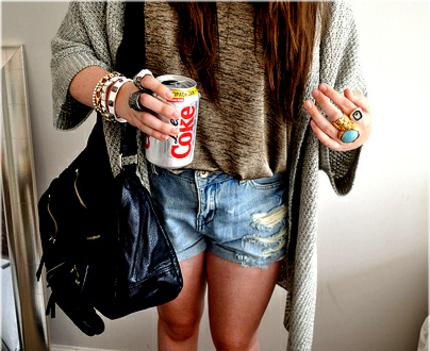Because anyone who takes headlines seriously—a universally bad idea—will be afraid to even look at a bottle of diet soda, let alone drink from one.
We can equally thank Dr. Ankur Vyas and his group for publishing the quintessential example of garbage science, and an all-too-willing press, obviously looking for juicy headlines. Or can't be bothered to read the study. Or have their own agenda. Probably all three.
As usual, there is a strong correlation between junk studies and misleading headlines. Here are some examples:
"Diet soda associated to women's heart risks" (ABC News)
"Diet drink danger: Possible link to heart risk in older women, study says" (CBS News)
"Study: Diet soda linked with heart disease and even death" (NBC News Channel 4, Oklahoma City)
"Regular Consumption Of Diet Drinks Linked To Heart Problems In Older Women" (Huffington Post)
"Diet Soda Ups Your Heart Attack Risk? "(Prevention.com)
There are MANY more. According to Google News, this story has been covered by 3,900 sources.
Too bad all 3,900 are wrong.

Image credit and link: Wellandgoodnyc.com
These "results" come from a presentation at the ongoing American College of Cardiology meeting, which is being held in Washington—where the truth is generally in short supply. In which case, the study authors picked the right place.
This piece of nonsense is so easy to debunk that my hamster could probably do it. Well, that was a lie too, since I don't have one. So I'll have to do it myself.
From Maggie Fox on CNBC: "Women who drink the most diet sodas may also be more likely to develop heart disease and even to die, according to a new study published Saturday."
I guess I really can't blame her, since the study leader Dr. Ankur Vyas, a cardiovascular disease physician at the University of Iowa said "Our study suggests an association between higher diet drink consumption and mortality."
Translation: "Dear Stupid Americans, Here is something that sounds really bad, and will get me in the news. Maybe even on Oprah. I know that it's a bunch of nonsense, but you will not, because the headlines are gonna really run with this and scare the crap out of you. Over nothing."
At least he had the decency to later admit "It's not an extreme risk." This did not make the headlines.
No it's not extreme. How about zero? Because there is absolutely nothing in this study that could lead anyone with even a passing knowledge of science or epidemiology to conclude that diet soda has health risk whatsoever. Nothing.
Here's why: The Iowa group studied 60,000 middle-aged women over a ten-year period. Data were accumulated from questionnaires—a notoriously unreliable method of data gathering. But this isn't a tiny fraction of the problem.
At the end of the study period the group took a look at the health of women who did, and did not drink diet soda. Lo and behold! Of women who drank two or more diet drinks per day, 8.5 percent had some sort of heart disease. But, for women who either drank fewer or no diet drinks that number was only 7 percent. Uh-oh. Smoking gun?
Not even close. Because buried at the bottom of the article is what is really going on: The women who drank more diet soda were less healthy to begin with. They were more likely to be overweight, to smoke, and to have high blood pressure than the other group.
So, let's correct the headline a bit: "Sick People are More Likely to Die." Accurate headline, but it won't sell many papers.
What is really going on here is a classic case of mixing up cause and effect. No, diet soda doesn't give you heart disease. You already have a higher heart disease risk, and drink diet soda to try to cut calorie consumption.
Playing basketball does not make you tall. Opening an umbrella does not make it rain. Going to sleep does not make the sun go down. Geese flying south do not cause winter. I could go on, but I'm starting to put myself into a coma.
Although this study borders on downright silly, the implications of this type of research and reporting are not. American people, not exactly known for their scientific acumen, read this stuff and it becomes fact. And we all get a little more confused every day. The result: the inability of the average person to make educated choices, since they are manipulated and/or confused by the vast amount of conflicting "evidence" that is flying around the internet.
The anti-aspartame loons must be jumping with joy over this. The study says NOTHING about the health effects of artificial sweeteners, but the headlines sure do. Guess who's going to win this one?
Front page image: Wellandgoodnyc.com




Comments